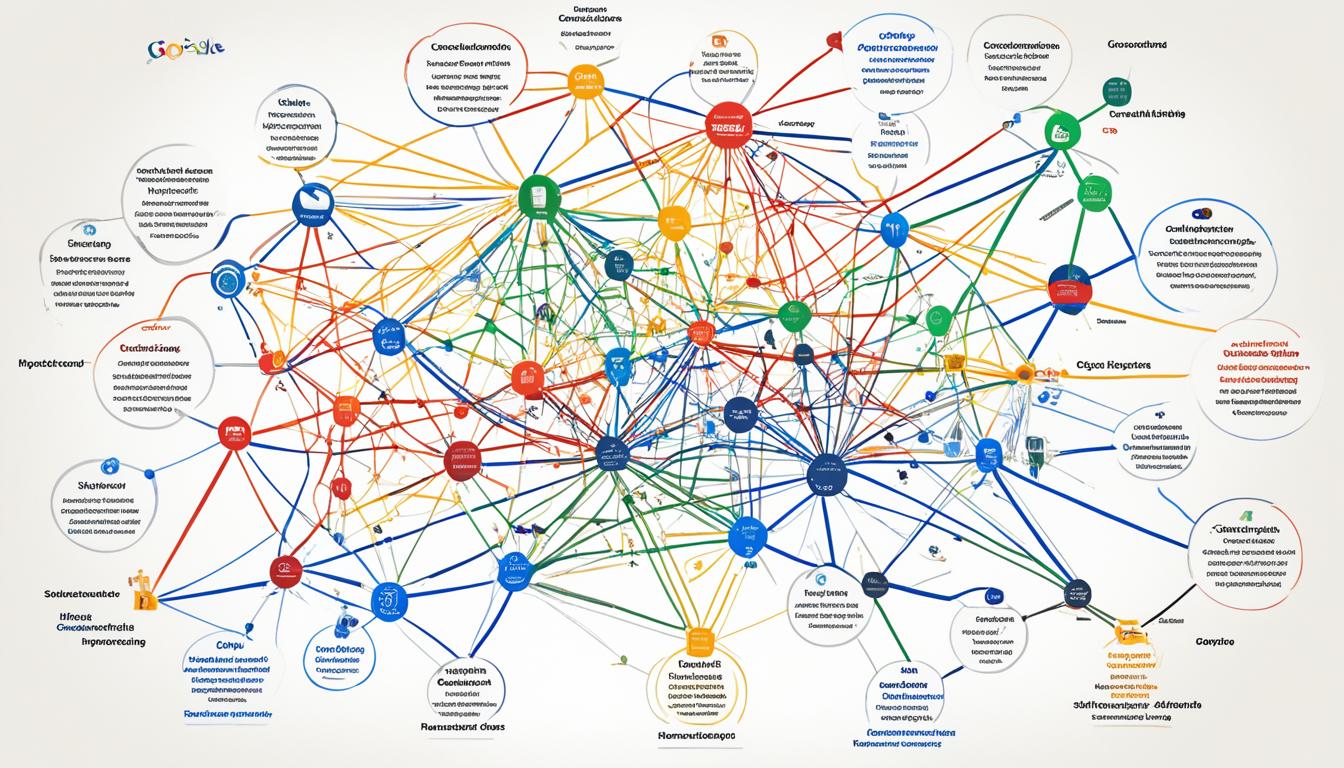Have you ever wondered who owns Google? We use it every day for searching, but not many know its owners. The details will likely surprise you. In our guide, we’ll explore Google’s ownership structure to find out who really rules this tech empire.
Knowing who owns Google is key to understanding its decisions and goals. Everyone from big shareholders to the company’s founders plays a part in where Google is headed.
We’re diving deep into Google’s ownership, highlighting those who shape its future. We’ll look at Alphabet Inc.’s creation, Google’s shift as its subsidiary, and how it changed ownership.
Let’s explore who the major shareholders are, including investment firms and mutual funds. We’ll see how Google’s founders, Sergey Brin and Larry Page, continue to impact the company while creating a lasting influence.
Ready to rethink Google’s ownership? Join us as we uncover who really owns Google.
Key Takeaways:
- Understanding Google’s ownership structure is crucial for comprehending the company’s decision-making processes.
- The birth of Alphabet Inc. had a profound impact on Google’s ownership dynamics.
- Major shareholders, including investment firms and public pensions, significantly influence Google’s direction.
- Google’s founders, Sergey Brin and Larry Page, continue to shape the company’s operations and strategic decisions.
- The understanding of Google’s ownership sheds light on its business strategy and future prospects.
Introduction to Google’s Corporate Structure
It’s key to understand Google’s corporate structure to see how it operates and makes choices. Google has changed its setup over time to fit its growing number of projects and areas.
Google has many parts and companies under it, with Alphabet Inc. as the main company. Alphabet was created in 2015. This break from Google let it focus more on its basic work and separate the new ventures.
This setup under Alphabet gives Google more freedom to focus on each area. So, each part can aim for its own goals. Yet, they can also use Alphabet’s help and resources when needed.
At the top level, Alphabet makes sure Google’s many businesses and deals are managed well. This way, the groups can work together and come up with new ideas.
Google’s setup shows its many ways of working and its promise to those it works with. With Alphabet at the core, Google can navigate the tech field. It’s always ready for new chances to grow.
The Birth of Alphabet Inc. and Its Impact on Google’s Ownership
In 2015, Google made a big change. This change brought to life Alphabet Inc., a big group. Alphabet Inc. became the parent company of Google. This change marked a new chapter for the big tech company.
The Transition from Google to Alphabet Inc.
Alphabet Inc. was created to bring more clarity and order to Google’s many projects. The idea was to separate Google’s main projects from its riskier ones. This way, each part could focus better and have its own leaders and budget.
The change was led by Larry Page, a co-founder of Google. He believed this new way would make each business run better on its own. He said they could “run independently and autonomously” under Alphabet.
All of Google’s smaller companies and projects then came under Alphabet’s wing. Each one got more freedom to do its own thing and chase its unique goals. This change aimed to make decision-making simpler and give a clearer picture of everything the company did.
Alphabet’s Role in Shaping Google Today
Alphabet Inc. has been key in how Google runs and plans for the future. Even though Google is a huge part of what Alphabet does, the new setup helps explore other areas. Now, Alphabet can invest in things outside of just search and ads.
Thanks to Alphabet, Google’s leaders can spend money and time smarter. They can look into hot new fields like self-driving cars, healthcare, and AI. This lets Alphabet and Google stay leaders in tech.
Alphabet also draws in top workers. It gives each part freedom to dream big and try new things. This makes a culture where being creative and taking risks is encouraged.
To sum up, creating Alphabet Inc. changed how Google’s ownership works. This change brought more focus, clarity, and freedom to Google’s parts. It also gave Alphabet room to grow beyond its old businesses of search and ads.
Understanding Google’s Ownership Dynamics
Google’s ownership is quite unique. It’s shaped by different types of shares, voting rights, and how preferred shareholders have a say. To really know Google’s ownership, we must dive into these areas.
Google offers two main types of stocks: Class A and Class C. Class A shares give the owners one vote each, but Class C shares don’t offer any voting rights. This setup lets a few shareholders control big decisions, even if they own fewer shares.
Voting rights are also key in how Google runs. Some shareholders get special shares that carry more than one vote. This means they can guide the company’s future more than others. So, not all votes are equal at Google.
Some shareholders are considered preferred and get special perks, like getting paid first in tough times. And, there can be special deals made with shareholders, like voting agreements. These extra deals can change who really has the power in the company.
To see Google’s ownership in action, check out the table below:
| Shareholder | Class of Shares | Voting Rights |
|---|---|---|
| Alphabet Inc. | Class A | 1 vote per share |
| Institutional Investor A | Class A | 1 vote per share |
| Institutional Investor B | Class C | No voting rights |
| Preferred Shareholder X | Class A | 2 votes per share |
This table gives a simple view of Google’s ownership. Alphabet Inc. has Class A shares and can vote. Institutional Investor A joins in votes with its Class A shares. However, Institutional Investor B can’t vote with its Class C shares. Plus, Preferred Shareholder X has more voting power with its Class A shares.
Knowing Google’s ownership details helps those looking at the tech giant understand who’s in charge. It gives insight into the complex world that guides Google’s decisions.
Who Owns Google: Key Shareholders and Their Influence

Understanding Google’s ownership helps us see who shapes its future. Key shareholders have a big say in Google’s strategies and choices. Let’s dive into who these shareholders are and how they affect Google’s work.
Institutional investors form a key part. They are big firms and groups with large ownership in Google. Because of their big shares, they can influence key decisions. Groups such as mutual funds and pension funds are among these investors.
Individuals with Google shares make up another important group. They can include direct shareholders or employees with stock plans. Even though they don’t have as much power as big groups, they still help guide Google by using their voting rights.
There are also partners with big interests in Google. These could be firms or groups Google works closely with. They bring special skills and their goals affect Google’s choices too.
However, shareholder influence is about more than just votes and decisions. Their support and investments help maintain Google’s financial health. This backing aids Google in growing and staying innovative. Together, they bring different views that shape Google’s success.
Next, we’ll look into Google’s founders and their influence on the company.
Exploring the Founders of Google and Their Legacy
The minds behind Google, Sergey Brin and Larry Page, played a key role in its triumph. With big dreams and a love for innovation, they turned Google into a global tech leader.
Sergey Brin and Larry Page: The Visionaries of Google
In 1998, Sergey Brin and Larry Page brought Google to life while at Stanford. They aimed to make info around the world easy to find. This goal changed how we seek knowledge online.
They introduced PageRank, an algorithm that made Google a powerhouse by ranking pages by relevance. Thanks to this, Google’s search engine soared to the top.
They focused on improving the search experience, adding tools like AdWords. AdWords changed online marketing and boosted Google’s income.
How the Founders Continue to Influence Google
Brin and Page left their daily Google jobs in 2019, but their wisdom still guides the company. They remain big figures at Alphabet, Google’s parent company.
They keep pushing for innovation and long-term success, shaping Google’s future. Their influence is felt in Google’s work culture and strategies.
Brin and Page are also big on charity. Their Chan Zuckerberg Initiative aims to better the world. Their efforts show their lasting commitment to create a positive effect.
The Role of Institutional Investors in Google’s Ownership

Institutional investors like pension funds and insurance companies are big in Google’s ownership. They have a lot of money to spend. This makes them important for Google’s success.
These big investors hold a lot of Google’s ownership. Because of this, they can guide Google’s future. They talk with Google’s leaders. Together, they make choices about the company’s strategy, how it operates, and even how much the top executives get paid.
These investors have their own rules and goals, too. This affects what they want from Google. For example, some investors focus on being green and doing good for society. They push Google to do more for the environment and focus on good governance.
To truly understand Google’s ownership, we must look at what these big investors do. By keeping an eye on their moves and what they say, we learn a lot. We can see how their thoughts shape Google’s path forward.
Google’s Controlling Interest and the Power of the Vote
Understanding who has the main say at Google is key. The main owners have the power to choose and shape the company’s path. It’s crucial to look at the voting power and control of those with the most shares in Google.
Larry Page, Google’s co-founder, has about 44% ownership in Alphabet. This gives him a big say in how things run. He owns 389.05 million Class B shares. Sergey Brin, another co-founder, has almost 42% ownership.
Other big owners matter too. Sundar Pichai, Google’s CEO, owns a small part, about 0.01%. Yet, as CEO, he has a lot of power to make decisions.
Institutional investors also own a large share of Google. Vanguard and BlackRock are two key players. They, along with others, have a big impact on the company’s decisions.
For a clear look at who’s who, check the table below:
| Shareholder | Ownership Stake (%) |
|---|---|
| Larry Page | 44% |
| Sergey Brin | 42% |
| Sundar Pichai | Less than 0.01% |
| Vanguard Group Inc. | 3.69% (Class A) 3.10% (Class C) |
| BlackRock, Inc. | 3.11% (Class A) 2.7% (Class C) |
| T. Rowe Price Associates, Inc. | 4.4% (Class C) |
| FMR LLC | 4.4% (Class A) |
These key shareholders have a big role in Google’s future. Knowing about Google’s owners helps us understand how big decisions are made. We see the power behind one of the world’s top companies, Google.
Major Shareholders of Google: The Top Contenders
Google, a top tech company worldwide, is owned by many. We will look at its major shareholders. They hold big stakes in the company.
Investment Firms with Significant Stakes
Big investment firms own much of Google. They use their know-how and money to grow Google’s value. Key firms in this game are:
- Vanguard Group: It’s a major Google owner. Vanguard’s focus on the long-term fits Google’s plans well.
- BlackRock: A big player in finance, BlackRock eyes Google’s growth chances all around the globe closely.
- Fidelity Investments: A big Google backer, Fidelity’s innovative style matches Google’s, making it important in Google’s ownership scene.
The Role of Mutual Funds and Public Pensions
Mutual funds and public pensions also own Google stock. They do this for their members, adding to Google’s varied ownership. Some top names in this field are:
- Fidelity Contrafund: This large fund is a big Google supporter. It aims to grow over the long term, appealing to those looking to invest in Google’s future.
- California Public Employees’ Retirement System (CalPERS): A leader among public pensions, CalPERS values lasting growth, like Google does.
- The Vanguard 500 Index Fund: This fund is popular for its low costs. It offers an easy way for people to invest in Google widely.
These investors, from big firms to funds and pensions, greatly influence Google. They help shape where Google goes with its decisions and plans.
| Investment Firm | Ownership Stake |
|---|---|
| Vanguard Group | Significant |
| BlackRock | Substantial |
| Fidelity Investments | Noteworthy |
| Mutual Fund/Public Pension | Ownership Stake |
|---|---|
| Fidelity Contrafund | Substantial |
| California Public Employees’ Retirement System (CalPERS) | Notable |
| The Vanguard 500 Index Fund | Significant |
Public vs. Private Ownership: Google’s Unique Position
Google’s ownership is quite special in the tech world. Alphabet Inc. is the head company of Google. It has a unique way of dividing ownership. This is different from many other companies. It’s publicly traded, but a few main people own most of it.
Alphabet is worth almost $1.75 trillion in the market. Yet, not everyone shares its ownership. Most of Alphabet, and so Google, belong to a select few, not the public.
The founders, Larry Page and Sergey Brin, have kept a lot of Alphabet for themselves. Larry owns about 44% of Alphabet, and Sergey owns almost 42%. Their big ownership means they get to make many important decisions.
Alphabet and Google’s CEO, Sundar Pichai, owns very little in comparison – less than 0.01%. However, his role as CEO is crucial. It lets him have a big say in where Google is headed.
Besides the founders, big investment companies also own a lot of Alphabet. For example, Vanguard Group Inc. has about 897 million shares. And BlackRock Inc. has 763 million shares.
These big investors have their own stakes in Google. They can shape its future. Their support and advice count a lot.
“Google’s ownership structure, with its mix of individual founders and institutional investors, creates a unique dynamic within the company. It brings together the innovative vision of the founders and the diligent oversight of experienced investors, fueling Google’s continued success.”
Being owned by both the public and private investors has its pros and cons. It helps Google raise a lot of money and be open about its actions. But, there’s also pressure to do well quickly.
This can lead to focusing too much on immediate profits. It might steer Google away from taking risks on new ideas. Balancing these two sides is key for Google’s long-term health.
Google’s situation as a mixed publicly-traded company is very interesting. It shows the importance of both founder vision and investor support. This mix guides Google’s path.
How Google’s Ownership Affects Its Business Strategy
Google’s ownership structure is key in shaping its strategy. The major shareholders’ interests play a big role. They impact strategic choices, what companies Google buys, and its investments. Knowing this helps understand Google’s goals and where it’s headed.
Big players like investment firms have a say in Google’s path. They hold a lot of Google’s shares. Since they have their own investment goals, they can push Google to do certain things. For instance, a tech-focused firm might encourage Google to focus on new ideas and research.
The top shareholders that own more of Google have more voting power. This means they can direct Google’s future. Their main goals affect Google’s choices, whether it’s about making money now or growing in the long term.
When Google looks to buy new companies or invest, these big shareholders often help decide. They make sure these choices fit Google’s overall plan and benefit the business. In this way, the shareholders’ ideas and goals are part of Google’s strategy.
In the end, who owns Google greatly affects how it does business. The goals and wishes of the main investors influence everything from big decisions to smaller moves. This gives a window into Google’s strategy and how it makes choices.
Conclusion
To truly grasp Google’s way, you must understand how it’s owned. Now with Alphabet Inc., Google has a whole new structure. This change plays a big part in how big decisions are made at Google. Shareholders and the creators have a big say in Google’s future.
Google’s mix of public trading and many owners makes for an interesting dynamic. It comes with good and tricky parts that affect Google’s plans. What significant shareholders want really does matter a lot. It shapes things like who Google buys, where they invest, and the path they take.
Google focuses on making things simple and better for users, like you and me. Larry Page wanted a “One Beautiful Google.” Everywhere, from their designs to neat info cards, this goal shows. Even Gmail staying in beta for years shows Google’s drive to always improve.
Learning about Google’s owners is essential to see its plans and how it grows. By seeing what big shareholders do, the design goals, and the focus on improving data, we really get Google. We see why it stands out in the tech world.
For more details on Google’s ownership, check out this enlightening article: Why the Future Belongs to Google.
FAQ
Who owns Google?
Alphabet Inc. is the owner of Google.
What is Google’s ownership structure?
Alphabet Inc. controls Google and its companies.
What is Alphabet Inc.?
It’s Google’s parent company and oversees its other parts. It aims for more clear management.
How has Alphabet Inc. impacted Google’s ownership structure?
Google became a small part of Alphabet Inc. after the change.
What are the different classes of shares and voting rights in Google?
Google has shares with different voting power. This means some can influence decisions more.
Who are the major shareholders of Google?
Big investors and individuals own a lot of Google. They have a big stake in the company.
What is the role of Sergey Brin and Larry Page, the founders of Google?
They started Google and still make big decisions for the company.
How do institutional investors impact Google’s ownership structure?
Investment firms help shape Google by owning significant shares. They influence where Google is headed.
Who holds the controlling interest in Google?
Alphabet Inc. has the most power over Google’s choices. It makes the main decisions.
Who are the major shareholders of Google?
Investment firms and funds have large ownership parts of Google.
How does Google’s complex ownership structure as a publicly-traded company impact its operations?
Google faces both good and tough aspects of being public. How it runs and decides can be complex.
How does Google’s ownership structure influence its business strategy?
Major shareholders’ goals shape Google’s big moves. This includes its buying and investing actions.
Source Links
- https://deal.town/help-net-security/google-fixes-chrome-zero-day-with-in-the-wild-exploit—may-2024-patch-tuesday-forecast-FKAQVAS5N
- https://www.neowin.net/news/oh-no-samsung-may-not-launch-the-galaxy-z-fold6-fe-due-to-uncertain-market-conditions/
- https://www.neowin.net/news/one-ui-61-update-brings-customization-editing-and-more-features-to-the-galaxy-s21-fe/

